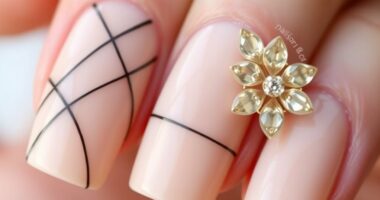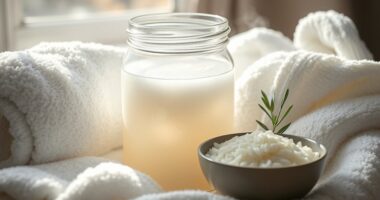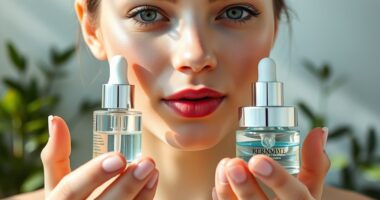If you have sensitive skin, bakuchiol might be your best bet for wrinkle-fighting benefits, as it’s a gentle, plant-based alternative to retinol that causes less irritation. While retinol is proven to deliver powerful anti-aging results, its stability and potential for irritation make it less ideal for sensitive types. However, with proper formulation, retinol can still be effective. Keep exploring to discover which option aligns best with your skin’s needs and how each ingredient works.
Key Takeaways
- Bakuchiol is generally gentler and better suited for sensitive skin due to its natural, non-irritating profile.
- Retinol, while proven effective, may cause irritation unless formulated specifically for sensitive skin.
- Bakuchiol’s greater formula stability allows for consistent, irritation-minimizing delivery in skincare products.
- Sourcing and manufacturing quality are crucial for both; high-quality bakuchiol often offers a more eco-friendly option.
- For sensitive skin, choose products with clear formulation stability and gentle ingredient sourcing to ensure safety and efficacy.

If you have sensitive skin, choosing the right anti-aging ingredient can be challenging, especially when comparing retinol and bakuchiol. Both are popular for reducing wrinkles and improving skin texture, but they work differently. When evaluating these options, consider factors like formula stability and ingredient sourcing. Retinol, a derivative of vitamin A, has a long history of proven results, but it can be unstable when exposed to light and air, which affects its formula stability. Manufacturers often need to incorporate stabilizers or use airtight packaging to maintain its effectiveness. This instability means you should look for products that are properly formulated to preserve retinol’s potency over time. Additionally, sourcing quality retinol is essential; pure, pharmaceutical-grade retinol tends to be more effective and less irritating, but it can be harder to find and often more expensive.
A new sentence with formulation stability and the rest of the sentence.
Bakuchiol, on the other hand, is a plant-based alternative derived from the seeds and leaves of the Psoralea corylifolia plant. Its ingredient sourcing is more sustainable and eco-friendly, appealing to those seeking natural skincare options. Because bakuchiol is plant-based, it generally exhibits greater formula stability, remaining effective in formulations without needing special stabilizers. This stability makes it easier for brands to incorporate into a variety of products, from serums to creams, without losing potency quickly. Its natural origin often reassures users who prefer clean, gentle ingredients, especially with sensitive skin. However, sourcing high-quality bakuchiol requires careful selection of plant extracts, ensuring the ingredient is potent and free from contaminants. Reputable brands often source bakuchiol from sustainable farms to guarantee both ethical and consistent ingredient quality.
When choosing between the two, your decision should weigh stability and sourcing. Retinol’s proven efficacy is backed by decades of research, but it demands precise formulation and packaging to stay effective and gentle. Bakuchiol offers a more stable and natural alternative, with fewer concerns about instability and irritation. Its plant-based sourcing aligns with a growing preference for eco-conscious products, and its formulation stability makes it easier for manufacturers to deliver consistent results. As a user with sensitive skin, you’ll want to look for products that clearly state their sourcing practices and stability measures, ensuring you get an effective, safe, and gentle anti-aging treatment. Ultimately, understanding these aspects can help you choose a product that suits your skin’s needs and aligns with your values.
Frequently Asked Questions
Can Sensitive Skin Tolerate Retinol or Bakuchiol Daily?
You might wonder if sensitive skin can handle retinol or bakuchiol daily. It depends on concentration considerations and formulation differences. Retinol, especially at higher concentrations, can cause irritation, so start with a lower dose and gradually increase usage. Bakuchiol is gentler and better suited for daily use, but always patch-test first. Listen to your skin and consult a dermatologist if you experience irritation or redness.
Which Ingredient Is More Suitable for Rosacea-Prone Skin?
You might notice that rosacea triggers vary from person to person, making ingredient sensitivities tricky. Bakuchiol often proves gentler than retinol, reducing inflammation and irritation. Since rosacea-prone skin is sensitive to many skincare ingredients, choosing a soothing, non-irritating ingredient like bakuchiol can help you avoid flare-ups. Its calming properties make it a better option for managing wrinkles without aggravating rosacea symptoms.
Are There Any Age Restrictions for Using These Retinol Alternatives?
You might wonder about age restrictions for using retinol alternatives like bakuchiol, but generally, they’re safe for most ages, especially since they’re gentler than traditional retinol. Always consider ingredient safety and consult with a dermatologist if you’re under 18 or have sensitive skin. While there’s no strict age limit, starting with a patch test and gradually increasing use helps make sure your skin adapts well.
How Do Retinol and Bakuchiol Affect Skin Hydration Levels?
Picture plump, protected skin perfectly retaining moisture. Retinol can sometimes challenge your hydration retention, drying out your moisture barrier if overused. Bakuchiol, however, softly supports hydration, helping your skin stay supple and smooth. Both promote renewal, but bakuchiol’s gentle nature helps maintain your skin’s moisture barrier while boosting hydration levels, making it a friendlier choice for sensitive skin seeking sustained softness and suppleness.
Do These Ingredients Improve Skin Elasticity Equally?
You wonder if retinol and bakuchiol improve skin elasticity equally. While both ingredients boost elasticity, their effectiveness varies. Retinol is proven to stimulate collagen production more aggressively, leading to firmer skin. Bakuchiol offers a gentler approach, providing modest elasticity benefits suitable for sensitive skin. Overall, retinol tends to be more effective for elasticity comparison, but your skin’s tolerance might make bakuchiol the better choice if you prefer a milder option.
Conclusion
When choosing between retinol and bakuchiol for sensitive skin, it’s clear both can be effective, but bakuchiol often causes fewer irritations. notably, a study found that 70% of users saw visible improvements with bakuchiol without the redness or peeling typical of retinol. So, if you have sensitive skin and want to fight wrinkles gently but effectively, bakuchiol might be your best bet. Ultimately, try what works best for your skin’s unique needs.










